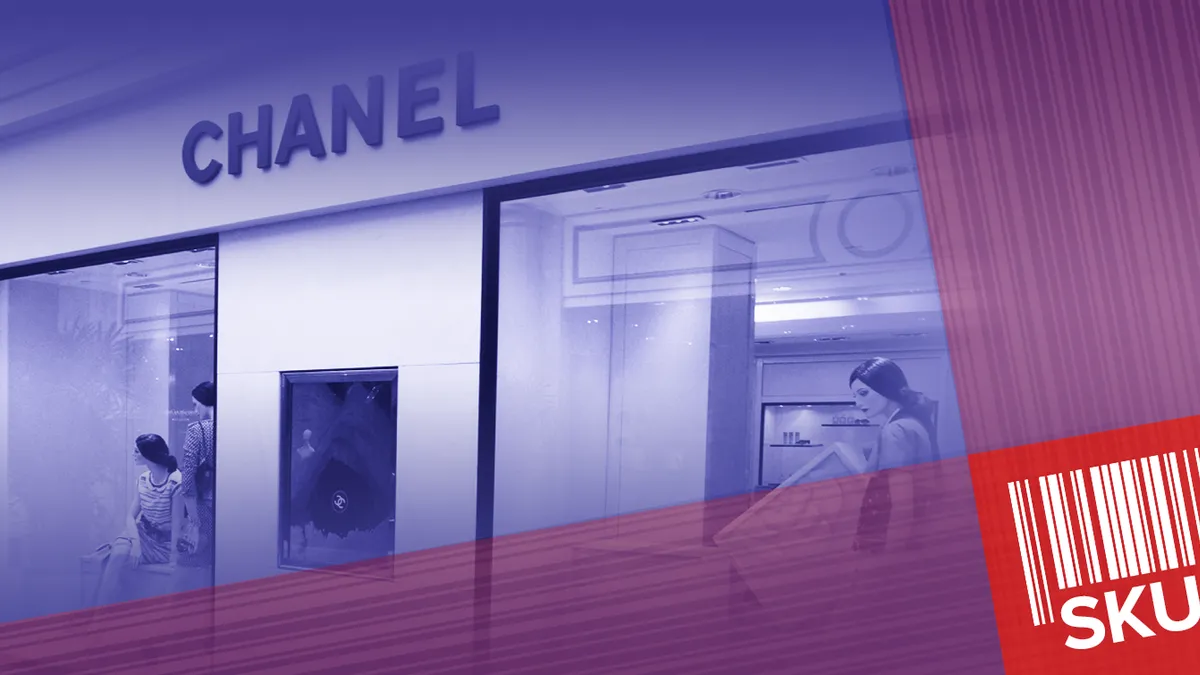Kaarin Vembar is obsessed with the luxury and apparel markets. She also has a sassy mouth so her managing editor decided to give her a column in an attempt to harness insight for readers. Kaarin can be reached at [email protected].
ThredUp is selling Chanel.
The recent discovery of the fashion house's items on the resale site briefly made my heart stop. Fashion lovers know that Chanel is in the middle of litigation with The RealReal over a similar scenario. So why are Chanel products on ThredUp's site?
In 2018, Chanel filed a lawsuit in federal court against luxury consignment company The RealReal, alleging that the company, "sells CHANEL-branded products, including handbags, which it purports to be genuine but are in fact counterfeit." In a statement to Retail Dive at that time, The RealReal fired back that it "unequivocally rejects Chanel's claims," and went on to state that "Chanel's lawsuit is nothing more than a thinly-veiled bullying effort to stop consumers from reselling their authentic used goods, and to prevent customers from buying those goods at discounted prices."
Well — a lot can happen in three years. The Chanel vs. The RealReal case is ongoing, but the companies have reached a temporary truce of sorts. In April both sides agreed to enter into a three-month stay to participate in private mediation.
In the meantime, resale fashion has grown exponentially. Consumers have embraced secondhand apparel out of increased awareness of the environmental impact of their purchase behavior. And, let's be honest, many people love the thrill of a great deal — a feeling that shopping secondhand apparel can provide. By ThredUp's own research, the resale market is forecast to reach $44 billion by 2029.
The company is proving the case for its market, too. It has forged partnerships with an impressive number of traditional retailers, including Macy's, Walmart, Gap and Madewell. Then, in March, the company filed for an IPO, sold 12 million shares and raised $168 million.
This is a smart company with smart leadership. It also, according to CEO James Reinhart, has an extensive process for how it selects items from sellers. In its earnings call this month, Reinhart explained that the company has a "rigorous 12-point quality inspection" for its products.
The company also has an authentication process, which it spells out on its website. ThredUp states that it has trained merchandisers "with years of experience identifying genuine designer items from the fakes" and that two trained authenticators inspect each designer item by hand. That includes cross-checking serial numbers, looking at logos, and examining stitching and craftsmanship. Additionally, merchandisers are able to consult with other people on internal teams to "double and triple check that the real deal is being put on our site."
My question, though, was if Chanel had anything to do with the authentication process.
Turns out, no. A spokesperson for the company simply stated "Chanel is not affiliated with this website." ThredUp did not respond to requests for comment.
I do think that there are good faith efforts happening on many platforms regarding authentication as secondhand purchasing skyrockets. EBay, for example, is hosting in-person events across different U.S. cities to authenticate items. This past fall, the company started a program where it vets sneakers sold for over $100 in the U.S. But — here's the biggest point — they do it with an independent, third-party authentication facility.
The RealReal has enthusiastic language about its verification techniques, saying that it is the "most rigorous authentication process in the marketplace" and that it is the "only resale company in the world that authenticates every single item we sell."
But, while authentication efforts are in place at ThredUp, some decisions around communicating those realities to consumers are… confusing.
For instance, in product pictures, the Chanel label is sometimes not shown. Which honestly had me wondering if I would purchase the product if I couldn't see that or other detail photos.
Occasionally products receive a "flawed gem" designation. The listing is upfront about what to expect. This dress, for example, shows minor signs of fabric wear.
This last example is not so much a question of authentication, but of brand integrity. Is Chanel OK with imperfect apparel from their fashion house on the market?
Then, as a consumer, would I be OK with it? And the answer is — maybe. For people who consign luxury items in person, a bewildering conundrum is that many shops don't take apparel that is too many seasons old. Just because it is a recognized label doesn't mean it will be accepted. (Sidenote: Receiving rejections at a consignment store was a catalyst behind Reinhart launching ThredUp in the first place.)
That ultimately means there are designer items that are in reasonable condition currently gathering dust in closets because they don't meet certain criteria. A platform like ThredUp seems like a natural fit to shop and consign those perfectly serviceable products.
Chanel, too, may be fighting the inevitable. Many retailers and some fashion houses are starting to see the possibility (and additional revenue stream) of having some sort of resale program. Alexander McQueen, for instance, partnered with Vestiaire Collective to resell its label. McQueen authenticates its own items that are then sold on the Brand Approved section of Vestiaire Collective's platform. The brilliant part of this process is that the owner then gets credits that can be used in McQueen boutiques, thus ensuring that money goes straight back into the fashion house. This type of circular economy gives the company some oversight of its brand and quality control.
Chanel understandably wants control of its own brand. What remains to be seen is if fashion houses will continue to fight resale sites in order to retain that kind of control.
























